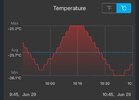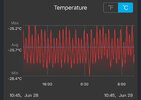How much degradation are you protecting against? Where's YOUR data supporting your position that it's more than *nothing* vs refridgerated temps.
We've shown you our home freezer data. Our burden of proof is met. You're making the assertion that degradation will happen in a home freezer. The burden of proof is now on you.
Here are a couple of quotes from the study you pulled those graphs from:
bivalirudin exhibited significant degradation at higher temperatures with losses of approximately 4% after 30 months at 4°C and 12% after 30 months at 45°C.
most peptide reference standards are stored at -20°C or colder




